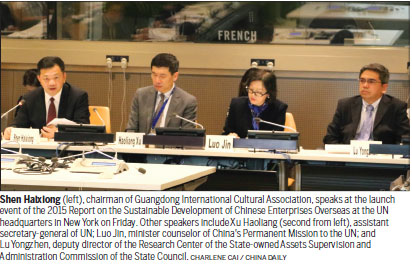Chinese overseas firms paying chunks in taxes
By Hong Xiao and Charlene Cai in New York (China Daily USA) Updated: 2016-10-03 11:25Chinese enterprises are making progress on sustainable development in their "going out" overseas - and providing host countries with tax support, according to a report released on Friday.
Chinese enterprises overseas paid $31.2 billion in taxes to host countries and regions in 2015, up 62.9 percent from 2014; foreign employees numbered 1.2 million - up by 392,000, said the 2015 Report on the Sustainable Development of Chinese Enterprises Overseas, released at United Nations headquarters in New York.
The report was jointly produced by the United Nations Development Programme (UNDP), the Research Center of the State-owned Assets Supervision and Administration Commission of the Chinese State Council, and the Research Institute of the Chinese Ministry of Commerce.
More than 250 Chinese companies that have oversea investment participated in the survey with questionnaire covering five main categories including economic performance, environmental impact and social impact.
From January to July, 2015, Chinese domestic investors have made direct investments in non-financial sectors in 5,465 overseas enterprises in 156 countries and regions in the world, with a total investment of $102.75 billion and year-on-year growth of 61.8 percent.
"This report analyzing the impact of Chinese overseas business on sustainability is significantly relevant to the international community," said Xu Haoliang, assistant secretary-general of United Nations, UNDP assistant administrator and regional director of Asia and the Pacific.
"The commitment of Chinese companies to continue to improve their operations across the social, environmental and other areas is encouraging news for global development. This approach resonates with the goal of United Nations," he said.
Shen Haixiong, chairman of Guangdong International Cultural Association, said at the ceremony that "the release of the report is fit to President Xi's development vision."
At the Hangzhou G20 Summit in September, President Xi Jinping expressed that China hopes to work with all parties to build an innovative, open, interlinked and inclusive world economy, and to push the world economy to a strong, sustainable, balanced and inclusive growth path.
Shen said continuing to improve the level of overseas sustainable development of Chinese enterprises is the international community's expectation.
In the course of "going out", Chinese enterprises pay much attention to sustainable development by abiding by the law of the host countries; taking the initiative to integrate into local societies; upholding the integrity of management; protecting the ecological environment; safeguarding the legitimate rights and interests of employees; ensuring the quality of products and services; actively participating in community building; and contributing to the economic development and social harmony of the host countries, he said.
Shen said many enterprises from South China's Guangdong province have made successful international investments in recent years.
Besides having achieved win-win cooperation with the host countries, those enterprises also have gained good reputations.
For example, Huawei Technologies Co Ltd, a telecommunication equipment manufacturing and services company based in Shenzhen, has competed globally since its founding in 1987. Huawei has developed into a multinational company with operations in more than 170 countries and regions.
"It could be regarded as a good example of Chinese enterprises' overseas sustainable development," Shen said.
"There are many more enterprises in Guangdong like Huawei, which adopt the concept of 'open cooperation and win-win' to integrate into the development from all parts of the world," he added.
Guangdong, a key economic growth pole in China, is the place where China started its reform and opening-up. It also is the strategic hub of the Belt and Road Initiative and one of the starting points of the Maritime Silk Road.
"All state-owned enterprises in China now have sustainable plans when investing overseas," said Lu Yongzhen, deputy director of the Research Center of the State-owned Assets Supervision and Administration Commission of the State Council.
Contact the writers at xiaohong@chinadailyusa.com.

- 'Cooperation is complementary'
- Worldwide manhunt nets 50th fugitive
- China-Japan meet seeks cooperation
- Agency ensuring natural gas supply
- Global manhunt sees China catch its 50th fugitive
- Call for 'Red Boat Spirit' a noble goal, official says
- China 'open to world' of foreign talent
- Free trade studies agreed on as Li meets with Canadian PM Trudeau
- Emojis on austerity rules from top anti-graft authority go viral
- Xi: All aboard internet express











